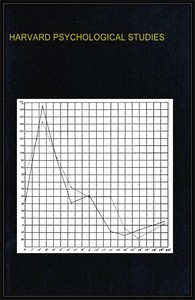Harvard Psychological Studies, Volume 2 by Hugo Münsterberg
"Harvard Psychological Studies, Volume 2" by Hugo Münsterberg is a scientific publication written in the early 20th century. This volume continues the exploration of experimental psychology initiated by Harvard University's psychological laboratory, which was established in the late 19th century. It covers various topics related to psychological research done at Harvard, including studies on optical perception, emotional expression, human attention, and comparative psychology among animals. The opening of this volume introduces Emerson
Hall, a newly built facility dedicated to the study of philosophy and psychology at Harvard, which opened in December 1905. Münsterberg emphasizes the importance of adequate space and specialized facilities for psychological studies, explaining how the laboratory's design facilitates both teaching and research. He outlines the historical development of psychological education at Harvard, detailing how the laboratory has evolved and become essential for experimental psychology, and he speaks to the relationship between psychology and philosophy, asserting that a sound psychological inquiry must be grounded in philosophical understanding. (This is an automatically generated summary.)
Read or download for free
| How to read | Url | Size | |||
|---|---|---|---|---|---|
| Read now! | https://www.gutenberg.org/ebooks/67222.html.images | 2.2 MB | |||
| EPUB3 (E-readers incl. Send-to-Kindle) | https://www.gutenberg.org/ebooks/67222.epub3.images | 3.9 MB | |||
| EPUB (older E-readers) | https://www.gutenberg.org/ebooks/67222.epub.images | 3.9 MB | |||
| EPUB (no images, older E-readers) | https://www.gutenberg.org/ebooks/67222.epub.noimages | 667 kB | |||
| Kindle | https://www.gutenberg.org/ebooks/67222.kf8.images | 4.4 MB | |||
| older Kindles | https://www.gutenberg.org/ebooks/67222.kindle.images | 4.5 MB | |||
| Plain Text UTF-8 | https://www.gutenberg.org/ebooks/67222.txt.utf-8 | 1.5 MB | |||
| Download HTML (zip) | https://www.gutenberg.org/cache/epub/67222/pg67222-h.zip | 3.8 MB | |||
| There may be more files related to this item. | |||||
Similar Books
About this eBook
| Editor | Münsterberg, Hugo, 1863-1916 |
|---|---|
| Title | Harvard Psychological Studies, Volume 2 |
| Note | Reading ease score: 58.3 (10th to 12th grade). Somewhat difficult to read. |
| Contents | Stereoscopic vision and the difference of retinal images / G. V. Hamilton -- Eye-movements during dizziness / E. B. Holt -- Vision during dizziness / E. B. Holt -- Visual irradiation / Foster Partridge Boswell -- The expression of feelings / F. M. Urban -- The mutual influence of feelings / John A. H. Keith -- The combination of feelings / C. H. Johnston -- The æsthetics of repeated space forms / Eleanor Harris Rowland -- The feeling-value of unmusical tone-intervals / L. E. Emerson -- Certainty and attention / Frances H. Rousmaniere -- Inhibition and reënforcement / Louis A. Turley -- The interference of optical stimuli / H. Kleinknecht -- Subjective and objective simultaneity / Thomas H. Haines -- The estimation of number / C. T. Burnett -- Time-estimation in its relations to sex, age, and physiological rhythms / Robert M. Yerkes and F. M. Urban -- Associations under the influence of different ideas / Bird T. Baldwin -- Dissociation / C. H. Toll -- The accuracy of linear movement / B. A. Lenfest -- The motor power of complexity / C. L. Vaughan -- The mutual relations of stimuli in the frog rana clamata daudin / Robert M. Yerkes -- The temporal relations of neural processes / Robert M. Yerkes -- The mental life of the domestic pigeon / John E. Rouse -- Reactions of the crayfish / J. Carleton Bell. |
| Credits | Clare Boothby, Jane Robins and the Online Distributed Proofreading Team at https://www.pgdp.net (This file was produced from images generously made available by The Internet Archive) |
| Language | English |
| LoC Class | BF: Philosophy, Psychology, Religion: Psychology, Philosophy, Psychoanalysis |
| Subject | Psychology, Experimental |
| Category | Text |
| EBook-No. | 67222 |
| Release Date | Jan 22, 2022 |
| Copyright Status | Public domain in the USA. |
| Downloads | 202 downloads in the last 30 days. |
| Project Gutenberg eBooks are always free! | |

